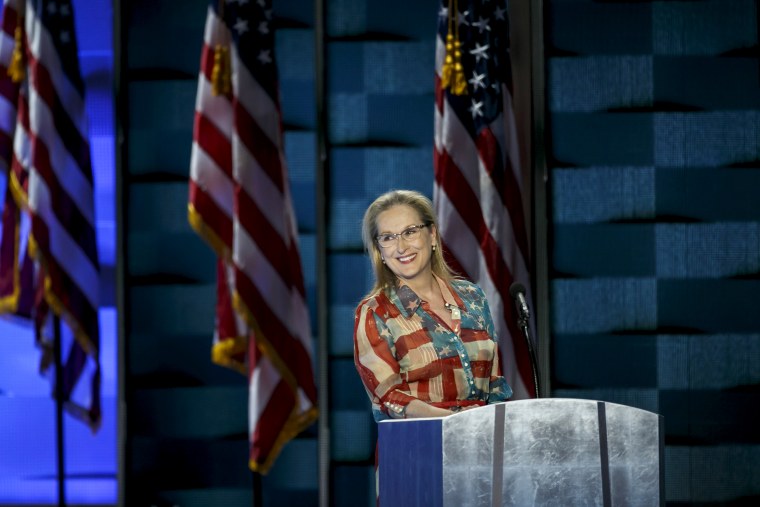Meryl Streep. Lena Dunham. America Ferrera. Elizabeth Banks. Debra Messing. Alicia Keys.
These names collectively would be a huge draw in any major feature film, but on Tuesday they lent their star power to another production -- the Democratic National Convention in Philadelphia.
While former President Bill Clinton may have been the night's biggest headliner, the mostly female celebrities who graced the stage (on the first two nights of the DNC) have played a vital role in helping to convey Hillary Clinton's personal and political narrative, while trying to connect with audiences watching at home.
Celebrities have long played a role in party politics, particularly in the last few decades on behalf of the Democrats, but in the 2016 race their activity at least feels more pronounced than usual. Besides the speaking slots at the DNC, a bevy of stars have also recorded a special a cappella version of Rachel Platten’s “Fight Song” as a tribute to the Democratic nominee:
"I do think celebrities are being more outspoken than ever this election cycle," Nina Terrero, senior correspondent for Entertainment Weekly, told NBC News on Wednesday. "The DNC really highlighted its pull among celebrities that have a huge following among the most valuable voters -- women, Latinos, millennials. I thought it was such an impressive line-up compared to what we saw at the Republican National Convention."
This year's RNC had notably fewer superstars. Despite GOP nominee Donald Trump's past boasts about a convention that would be star-studded, Scott Baio and Antonio Sabato, Jr. were the only famous figures to materialize last week, and their presence is not likely to bring any new voters into Trump's tent.
Clinton's famous fans, on the other hand, may perform a valuable function -- persuading married women who have traditionally voted Republican to flip to the Democrats, on account of not just history, but also trepidation about Trump. With Clinton trailing Trump consistently among men, her over-performance with this crucial slice of the electorate (she had a 5-point lead among married women in a May NBC News|SurveyMonkey Weekly Tracking Poll) could be a deciding factor come November.
"Once again, women are going to be some of the most important voters in this election," former Obama White House deputy press secretary Bill Burton told NBC News on Wednesday. "The fact that the Clinton campaign is highlighting women from all walks of life -- not just celebrities -- makes perfect sense as she reaches out to women all across the country."
According to Terrero, stars like Ferrera and Dunham are able to uniquely personify and personalize elements of Clinton's agenda, in a way that the sometimes charisma-challenged candidate herself can't.
"[America Ferrera's] message last night is I am the Latino immigrant that Trump so often speaks against," she said. "She put a face on that anonymous person. And Lena Dunham did the same thing by identifying as a pro-choice sexual assault survivor."
"They are part of a certain class of women in Hollywood who are outspoken feminists and their speaking out is just a natural extension of Hillary Clinton making history as the first female nominee," Terrero added.
But that does not mean that all is hunky dory among Hollywood progressives. Not unlike the bitter split between rank-and-file Democratic voters, celebrities also became firmly entrenched in the Clinton and Sanders camps during the protracted primary race. And while Sarah Silverman's "you're being ridiculous" broadside directed at her more extreme fellow Sanders supporters may have been a key turning point toward party unity, not all of Hollywood's left wing is playing nice.
Outspoken Oscar winner Susan Sarandon, for instance, has not been shy about insisting that a Donald Trump presidency might be a less frightening prospect than a Clinton one. And her dour expression in the audience at the DNC briefly became a meme when it was shared on social media with the caption "having the worst time ever." Not only did the "Thelma & Louise" star confirm the accuracy of that description, but she formally declared she was "out" of Democratic party politics following Clinton's official nomination on Tuesday.
"So now it's up to her," the actress said following Sanders' endorsement speech. "Don't blame him if she loses."
And celebrity surrogates can also be among the most undisciplined, as Sanders learned the hard way when actress Rosario Dawson resurrected memories of the Monica Lewinsky scandal in an off-message moment. Or when actor Tim Robbins dismissed Clinton's South Carolina victory as no different than winning Guam.
Meanwhile, the presence of elite Hollywood stars could also have the unintended effect of alienating some viewers, many of whom already see Clinton as out of touch with average Americans. While live-blogging day two of the convention, even Clinton supporter Andrew Sullivan lamented: "Another fricking actress. How many women work as actresses? Why do actresses have some premium on political wisdom?"
But Terrero believes the risk of deploying famous figures is worth the rewards.
"I think if anything celebrities draw more attention to a candidate's platform by virtue of the 24/7 entertainment news cycle," she said. "We are seeing celebrities across all generations, all coming together in support of Hillary, this is the one issue that they can all get behind."
